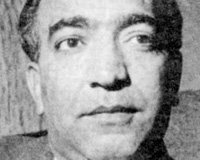Son of Hajj Motamed, Seyyed Mehdi Pirasteh was born in 1911 in Arak. Following his early education he studied law in the University of Tehran. He entered the service of ministry of Justice and became assistant public prosecutor and magistrate of Arak, prosecutor of Saveh, the chief of Tehran court of second instance. He was supreme court...
Son of Hajj Motamed, Seyyed Mehdi Pirasteh was born in 1911 in Arak. Following his early education he studied law in the University of Tehran. He entered the service of ministry of Justice and became assistant public prosecutor and magistrate of Arak, prosecutor of Saveh, the chief of Tehran court of second instance. He was supreme court judge, and the chief head of Tehran courts of second instance. He became the prosecutor of Tehran, 1947. The case of Mohammad Massud’s assassination was heard in a court where he was the judge. He entered the sixteenth Majlis from Saveh. He was a member of the minority which was against Mohammad Mossaddeq. In a Majlis speech delivered by him in Dec. 8th, he said that: “There is no security in Dr. Mossaddeq’s government, the rules are not regarded, freedom is not regarded, and human rights are not regarded”. When Mossaddeq’s minister of Justice, Lotfi purged Pirasteh with some disreputable judges from the ministry, in retaliation he attacked to his house and beat him up with stick. Again after the 19th August coup of 1953 he was elected from Saveh and Zarand for the eighteenth Majlis.
After the inauguration of the Majlis he left for France to get PhD. at law. On his return, he became deputy minister of interior, governor of Fars, governor of Khuzistan, and minister of interior in Alam’s cabinet. In the bloody uprising of 15 Khordad of 1963, he was the minister of interior carrying out the orders of the Shah. He was Iranian minister to Iraq from 1964 to 1967.
Prior to leaving for Iraq, Pirasteh asked to have audience with Imam Khomeini to discuss the interests of the ulama and claimed to have full powers. Imam Khomeini’s reply was that if he had powers to dissolve the majlises and cut the relations with Israel and grant the full freedom of speech and press, he could be offered audience otherwise it was better for him not to waste time.
In the late years of the Shah’s regime, he founded a rule oriented organization called as “the Constitution Defenders’ Front” and unsuccessfully tried to establish relations with the religious circles.
Then he left for United States and found a society called “the guardians of the constitutional law”.
https://iichs.ir/vdca.6n6k49n0agt14.html
iichs.ir/vdca.6n6k49n0agt14.html
